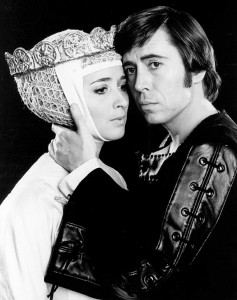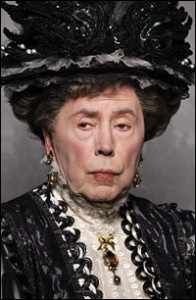It was the opening night of London Assurance at the Roundabout Theatre in 1997. I was sitting in Brian Bedford’s dressing room after the show when there was a gentle knock on the door. It opened and a frail elderly lady made a tentative entrance. “Brooke, darling,” Brian said in that inimitable—though often imitated—voice, as he ushered in Brooke Astor with the ease and delight of an old and dear friend. The doyenne of New York’s social world had come to pay court to one of Broadway’s true aristocrats.
As I quietly made my exit, the thought occurred to me that Brian Bedford had come a long way from his Yorkshire roots, where, in his own words, he had a mean and unhappy childhood. A scholarship to RADA, where he was a prize winner in a class that included Alan Bates, changed his life and ignited a passion for the classical theatre that lasted throughout his long career. Through his talent, his technical skills, his perseverance and his remarkable artistry, he overcame considerable youthful privations to become one of the most revered stage actors of his time.

There were very few major roles in the classical canon that he didn’t make his own. He was a dashing Hamlet at 21, and, in one of the greatest performances of his career, he last appeared on Broadway as a definitive Lady Bracknell for the Roundabout. In between these poles, he played every Shakespeare role of note, and conquered new territory in the work of contemporary playwrights like Arthur Miller and Peter Shaffer. His handsome appearance made him a matinee idol in his youth, and as he aged gracefully, he became an accomplished character actor who could lead a company with style and energy.
While Broadway was a natural home for this most mercurial actor, it was at the Stratford Festival in Ontario that he made the most impact. From the mid-1970s, when he finally broke his ties to his native Britain and, together with Maggie Smith, followed Robin Phillips to Canada, he gave successive Stratford audiences some of the greatest performances in its history. Together with his husband, Tim McDonald, he made it his home and his artistic center. While he made occasional forays to Broadway and to Hollywood, his heart was in Stratford, and it was there that he truly blossomed into the great actor that had been his early promise.
When I first met Brian at Stratford, I was immediately taken with his charm, his intelligence, and his old-fashioned courtesy. A couple of years later, he suggested to Todd Haimes that I might direct him in London Assurance. It was a part that could have been written for Brian. Dion Boucicault’s 19th-century character Sir Harcourt Courtly is flamboyant, narcissistic—one of that prolific writers greatest comic creations. What Brian brought to the role was a wicked and infectious sense of humor, a classical elegance, and a kind of charm that enveloped the audience from his first magnificent entrance.
He was also a master of stage business. During an early scene, he established the vanity of the aging Sir Harcourt, whose eyesight forced him to read the morning newspaper at some distance. When his butler appeared, Brian drew the paper sharply closer to his face, establishing in one gesture a character whose flirtation with two beautiful younger women is the comic engine of the play.
Our next project, also at the Roundabout, was Tartuffe, which had been one of Brian’s greatest triumphs at Stratford and in New York. This time he played Orgon to Henry Goodman’s Tartuffe. The famous scene in which Tartuffe tries to seduce Orgon’s wife Elmire while Orgon listens from under the table is one of Moliere’s greatest comic achievements. But, complaining of a bad back, Brian decided that he would rather not spend the scene in a recumbent posture hidden from view. Sur wonderful designer, the genius John Lee Beatty, was game to create a tunnel where Brian could escape without the audience seeing him. Several attempts were made to achieve this during our technical rehearsals, but on each occasion, our increasingly frustrated voice assistant director would shout out from the balcony or the upper circle, “I can see you, Brian.” After a while, it was agreed that it was a hopeless endeavor. With some reluctance, Brian accepted that he would have to remain under the table for the scene—and turned the moment into comic gold, both as he went under the table and when he emerged.

And Brian was a definitive Lady Bracknell in Stratford’s production of The Importance of being Earnest, which he also directed. The Roundabout production later earned him his seventh Tony nomination. Costumed to perfection by Desmond Healy, he played that aristocratic Gorgon as a woman completely bewildered by the modern world, and who found it almost impossible to understand the changing social climate that her daughter and her nephew embraced with such enthusiasm. Every vocal inflection, every move, every tilt of the head was aristocratic, haughty, dripping with noblesse oblige. There was no hint of the Yorkshire lad anywhere. Every entrance was magisterial and carefully planned.
It was a performance that used every ounce of this remarkable actor’s instinctive talent and his immense technical skill, and a fitting climax to a career that embraced classical theatre with a passion that gave great joy to many thousands at Stratford and in New York. He will be greatly missed on the stages of both places. They were his natural habitats.
Goodnight, Sweet Prince.

